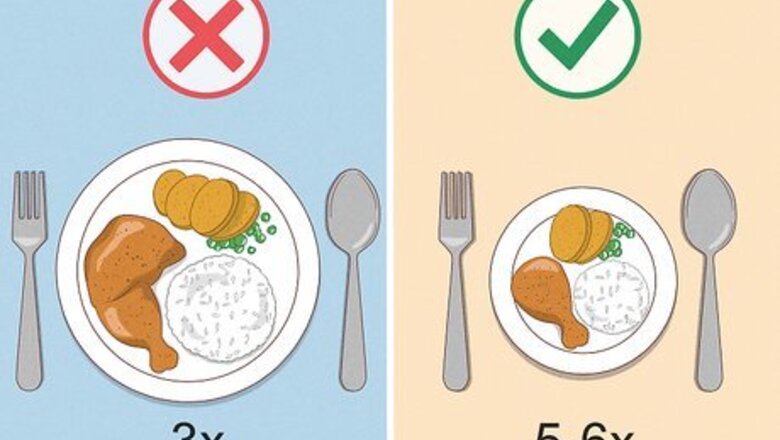
views
Eating Enough
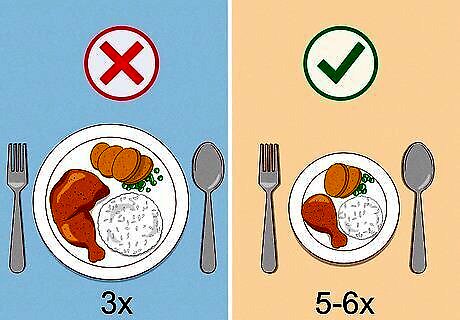
Eat smaller meals, more frequently. Being underweight means you will have lower energy requirements and a smaller stomach, so you will become full faster. Planning on eating five or six slightly smaller—but complete—meals throughout the day can help you to get the nutrients you need more regularly, and to struggle less with finishing large portions at the beginning. And, as with any seemingly insurmountable task, breaking it into smaller parts can help to make it feel achievable. ”Hara hachi bu” is a Confucian saying which means to eat only until you are eighty percent full. While usually thought of as a mantra for those trying to avoid overeating, it can be helpful for keeping the big picture in check: the point of this is to be healthy and well, not to keep eating to the point of being uncomfortable. You might already know that eating more frequently is also a tip given to those wanting to lose weight as well, to maintain the body's metabolism. So which is right? Both, actually! It just depends on what those frequent meals you're eating consist of. Slowing your metabolism can be attempted to gain weight, but it's not a healthy method that's generally advised.
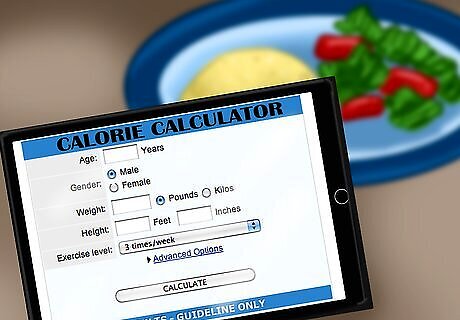
Eat 250-500 extra calories each day. This is a good baseline to maintain when you’re trying to pack on pounds. Searching online for a calorie calculator will yield multiple results, any of which you can use to determine how many calories are necessary to maintain your current weight. Then, add 250-500 to that number.
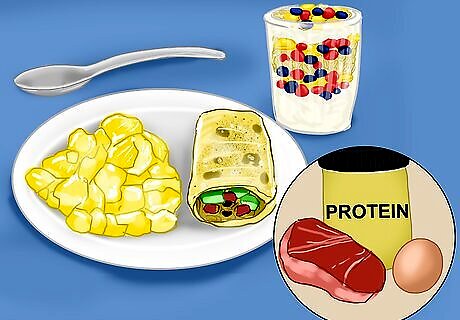
Choose high-calorie, protein-dense foods. Meats, cheeses, and nutritious whole-grain, complex carbohydrates are excellent choices. While simply eating a lot of nearly anything will make you gain weight, care must be taken to also answer the nutritional deficiencies that are part of being underweight. Example breakfast dishes: scrambled eggs with cheese, yogurt with fruit and granola, and breakfast burritos. Example lunch dishes: chicken breast sandwich with avocado, tuna salad, and whole wheat bagels with cream cheese. Example dinner dishes: steak with cooked vegetables, baked potatoes with butter and sour cream, and grilled salmon with rice.
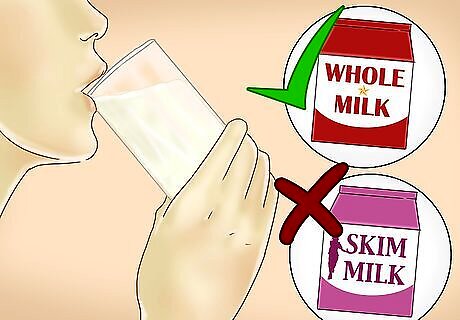
Drink whole milk, not skim. Full-fat options should be taken over fat-free alternatives whenever possible. Light or fat-free versions of food often lead to your body being just as full, but with fewer nutrients to put to work. This rule doesn't apply as you might think to cuts of meat. Fattier meats aren't an overall bad choice--and are more affordable than leaner cuts--but meat with less fat just means more protein, which is good for our goal here.
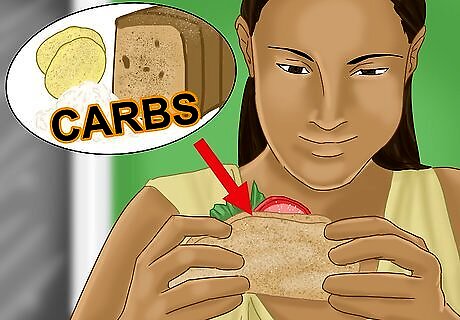
Load up on complex carbs. Regular carbohydrate intake is necessary to gaining and keeping weight. Carbs are regularly broken down into glucose (sugar) for energy. In their absence, your body will turn to and break down those other sources of energy you've been working so hard to tack on: fat and protein.
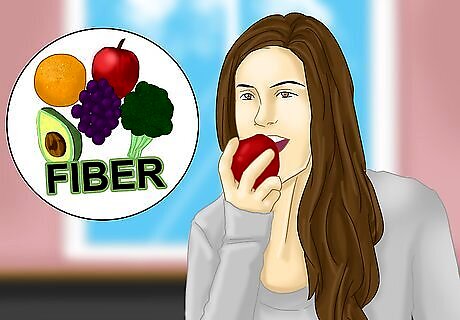
Include plenty of fiber. Fiber is critical to digestion, something you’ll want all the help you can get on once you start eating more than you’re used to. It’s found in beans, oats, bran, fruits, and vegetables.
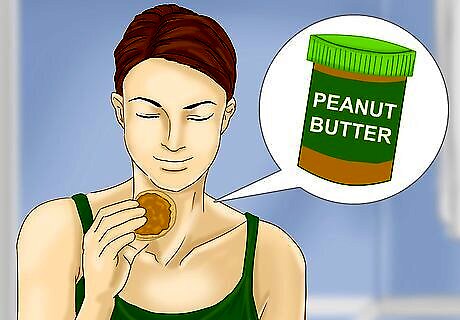
Attack snacks. Sneak in bites of peanut butter before bed, or a handful of nuts as you go grab the mail. Small snacks eaten throughout the day will add up. It’s certainly okay to occasionally splurge on your favorite sugary, salty, junky treats too, as long as it’s not all you snack on. Try eating a large snack or even a small meal before you go to bed. The calories from this nighttime snack are more likely to be stored in your body as you sleep instead of burned for energy. This may help you gain weight.
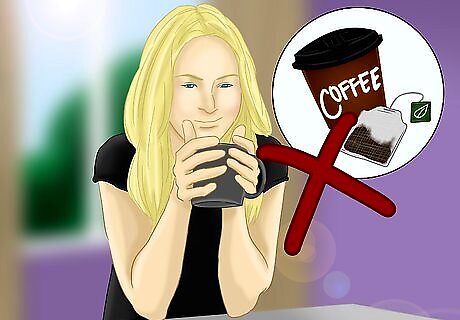
Avoid caffeinated drinks. Caffeine suppresses a person’s appetite, and when striving for weight gains you’ll want all the appetite you can get. They aren’t actively keeping your weight down, but you should be aware of the overall effect they have on your diet. These include: Coffee Tea Sodas Energy drinks, e.g., Monster Energy, Red Bull
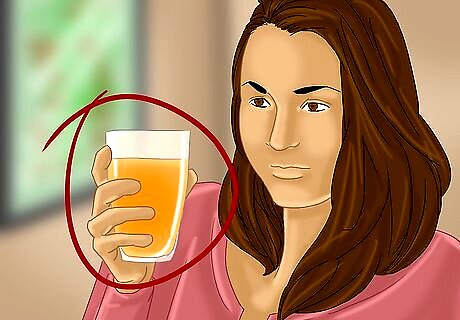
Go easy on fluids. Drinking too much before meals can mean you’re not leaving room for the nutrient-dense food you need to be eating. Don’t abstain from drinking, but don’t let beverages fill up the valuable real estate in your belly you should be using on your meals. If drinking with a meal isn’t working well, try waiting to drink until a half hour or so after you’re done eating. Don’t dehydrate yourself! The exact needs of every person are different, but a healthy diet does requires you to remain hydrated. Be sure to drink several glasses of water throughout the day.
Exercising Right
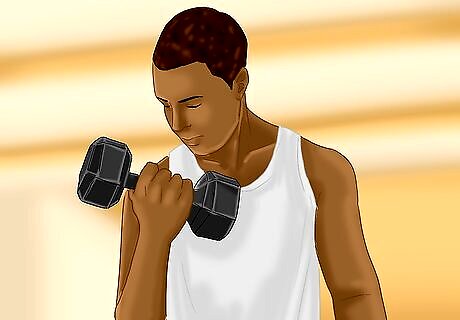
Lift weights. Strength training is an important avenue for gaining weight and staying healthy. Increasing your food intake and building muscle at the gym is an effective two-pronged approach. If you want to put on weight, opt for fewer repetitions with more weight instead of the opposite. Each exercise is different, but 10-12 reps is considered a normal amount for a majority: shoot for 6-8 in these instances instead. While lifting weights is focused on building muscle, it isn’t only for bodybuilders. Nothing about lifting weights says you will necessarily become “bulky,” if you fear your body becoming too big after gaining weight.
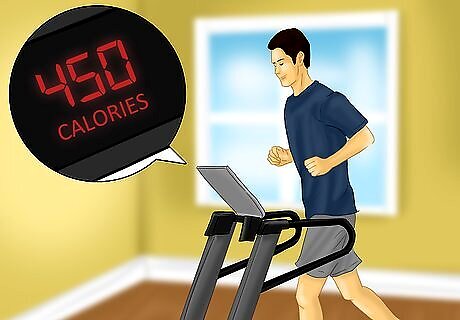
Limit cardio. Cardio is important for overall health and strengthening the circulatory system, but aerobic exercise will burn weight you probably don’t want it to. Take it easy on the treadmill, or increase your caloric intake to accommodate for the losses there. 3500 calories equals about one pound of fat when it comes to weight loss and gain. Keep this in mind when considering how many calories you'll have to make up after a workout. Many machines display an estimate of the calories you've burned.
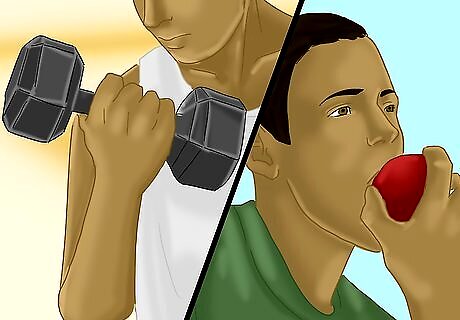
Refuel your body diligently. Exercising will burn energy as you’re putting it into your body, but it can also stimulate your appetite. This will help you to establish and solidify better, more regular eating habits as you respond to the energy needs of your body. Particular care should be taken to make sure you’re getting the requisite protein for rebuilding your muscle after a day at the gym. Meats, eggs, and cheese are effective here, as are nutritional supplements and shakes made especially for post-workout intake.
Maintaining Your Gains Through New Lifestyle Habits
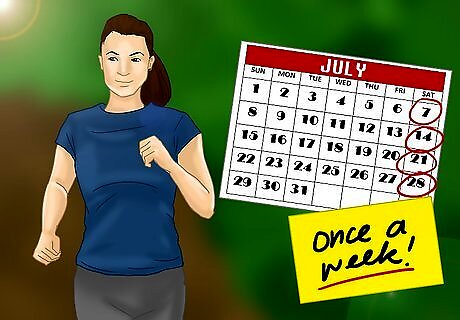
Moderate prolonged physical activity. Activity is integral to a healthy lifestyle and to gaining weight in a responsible way, but don’t go overboard. Especially if you have a job or hobby which requires you to be on your feet all day, constant movement can burn the excess calories you’re taking in before you even start to see the gains you’re looking for.
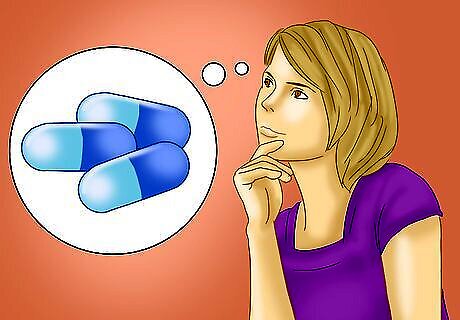
Understand your medications. Prescription medicines or treatment regimens can have side effects which lead to weight loss. Nausea is also common, which is certainly a problem for anyone attempting to muster up the appetite for five or six meals a day.
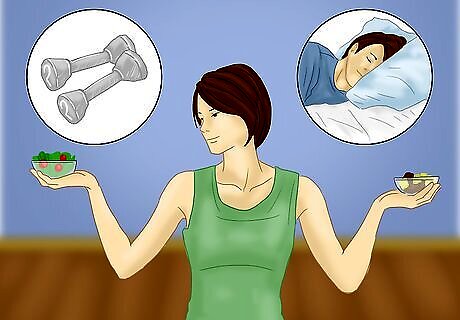
Stay healthy. Sickness will stop your weight gain plan in its tracks, so it’s important to still eat a healthy diet (even if you’re eating a lot more of that diet) and to get plenty of rest and exercise. Being underweight can lead to a weaker immune system, so this will require particular diligence on your part. Anemia, caused by iron, folate, or vitamin B12 deficiencies, can occur among the underweight. Supplement your diet with these nutrients if you feel dizzy, fatigued, or headache-y. Sudden or substantial weight loss can also be indicative of disease. The issue could be digestive, thyroid-related, diabetes, or even cancer. Only a medical professional can determine this, so schedule a consultation if experiencing any unusual weight loss.

Aim for overall wellness. Stress, anxiety, and depression can have unwelcome effects on appetite, cause difficulty in achieving eating goals, and be all-around disruptive of a person’s other attempts at self-care. If you feel this is applicable to you, consult your doctor for help in how to best manage your mental well-being. Body dysmorphia and eating disorders are serious issues relating to self-perception and weight, both of which should be diagnosed and treated by a medical professional. Up to 30 million people of all ages suffer from eating disorders in U.S., and eating disorders have the highest mortality rate of all mental health issues.



















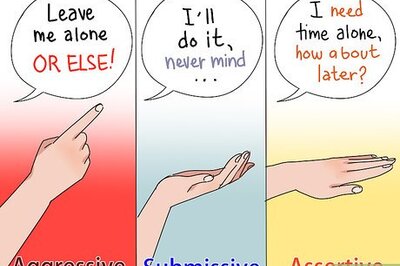
Comments
0 comment